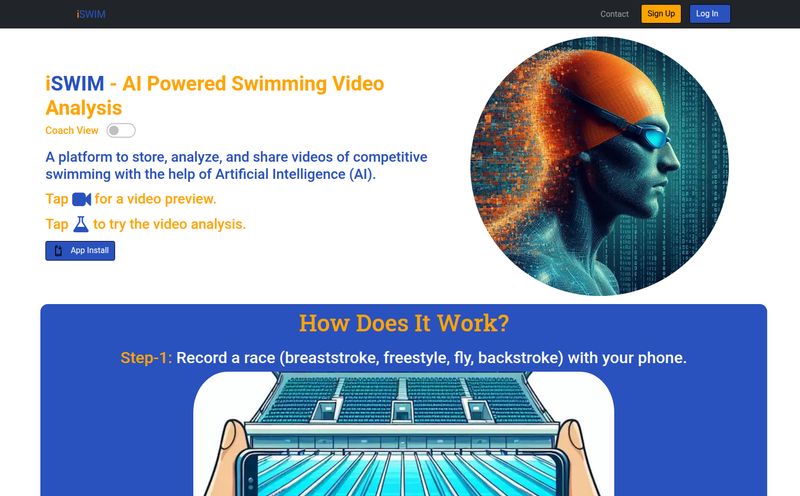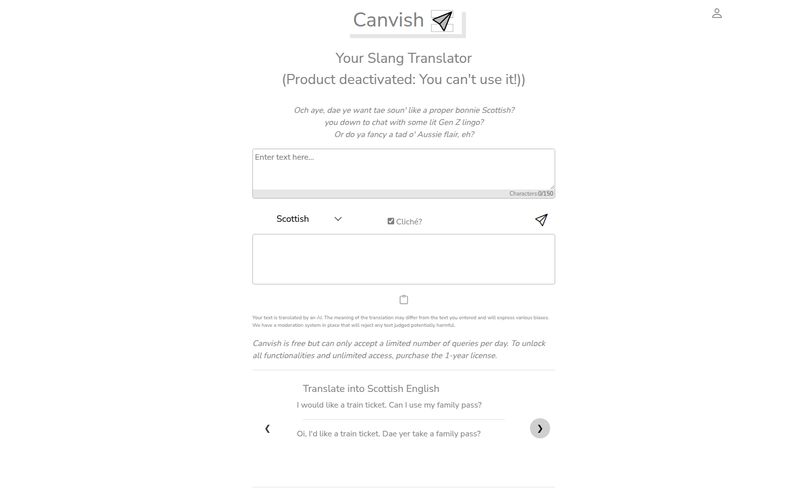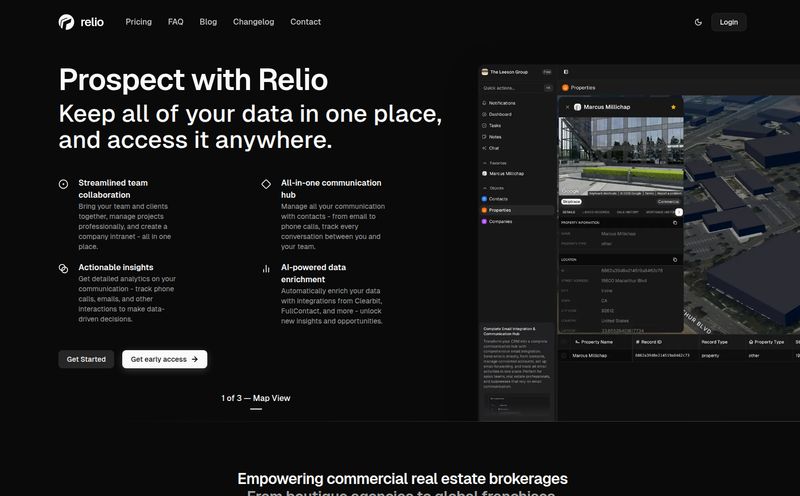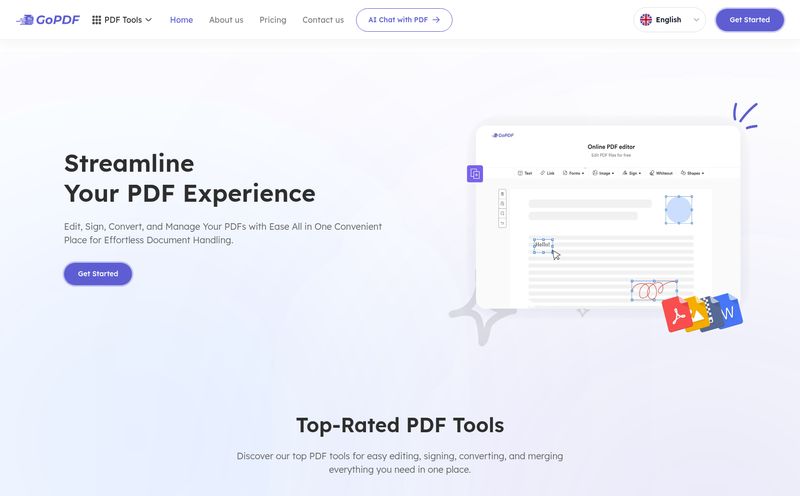My relationship with my phone is… complicated. One minute, it’s an indispensable tool for work and connecting with people I love. The next, it’s a black hole of mindless scrolling that has somehow devoured two hours of my evening. I've tried everything. Setting timers (I ignore them). Deleting apps (I reinstall them). The classic "leave it in another room" trick (I just go get it). Every SEO pro I know struggles with this; we're wired to be online, to check the stats, to see what's trending. It’s a professional hazard.
So when I stumbled upon an app called Meaning, which calls itself the “world’s first AI screen time coach,” my curiosity was piqued. An AI coach? Not just another blocker, but a coach? It sounds like something out of a sci-fi movie, but the premise is grounded in a problem we all face. I had to see what this was all about.
So, What Exactly Is This Meaning App?
At its core, Meaning is an app blocker for your iPhone. Okay, not the most revolutionary start, I know. We’ve seen those before. But the magic here isn’t in the what, it’s in the how. Instead of just putting up a digital wall, Meaning puts up a friendly gatekeeper—an AI powered by ChatGPT-4—that you have to talk to.
Think of it like this: instead of a padlock on the cookie jar, you have a very polite, very logical nutritionist standing in front of it asking, “Are you sure you need that cookie? What’s your goal for this snack?” Suddenly, you’re forced to pause. To think. To be intentional. That’s the entire philosophy behind Meaning.
The 'Chat to Unlock' Feature is Actually Kind of Genius
This is the centerpiece of the whole experience. Let’s say you’ve blocked Instagram for the evening because you have a deadline. Your muscle memory betrays you, and you tap the icon. Instead of the app opening, a screen appears: “Instagram is locked.” Below that, a chat interface with your AI coach.
You have to type in why you want to open the app and for how long. For example, “I need to check a DM from a client for 5 minutes.” The AI will then respond, something like, “Great! I’ve unlocked Instagram for you for 5 minutes. Get it done and I’ll see you back here soon!”
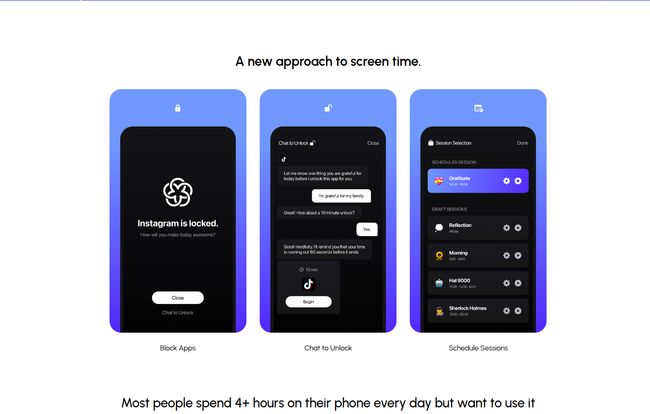
Visit Meaning
It’s a simple interaction, but it’s shockingly effective. That tiny bit of friction is enough to break the spell of mindless tapping. It forces you to justify your actions, even just to yourself. More often than not, I found myself closing the chat and realizing I didn’t really need to open Twitter after all. It’s less of a warden and more of a personal trainer for your digital habits, spotting you to make sure you don’t drop the weights on your own productivity.
Setting Up Your Digital Boundaries
Getting started is pretty straightforward. You download the app, give it the necessary permissions through Apple’s Screen Time API (a standard practice for these kinds of apps), and then the fun begins. You can create different “Sessions.” For example:
- Deep Work: Block social media, news, and games from 9 AM to 5 PM on weekdays.
- Morning Routine: Block everything except your meditation and journaling app until 8 AM.
- Family Time: Block work-related apps like Slack and email in the evenings.
The customization is there. It’s not a one-size-fits-all sledgehammer. You can fine-tune your schedules and blocked apps to fit the contours of your own life and your specific digital vices. I set up a “Content Writing” session that ruthlessly blocks everything except my research tools and music. It’s been a game-changer.
How Does Meaning Compare to the Competition?
I’ve used my fair share of digital wellness tools. Some folks swear by apps like Opal or One-Sec, and they're great for what they do. Opal is a fantastic, heavy-duty blocker, and One-Sec’s approach of forcing a deep-breath pause is clever. But Meaning feels… different. It’s less about brute force and more about behavioral psychology.
Where other apps are a hard “no,” Meaning is a soft “why?” That human-like interaction, even though it's with an AI, feels less restrictive and more supportive. It’s the difference between a locked door and a conversation. For some, the locked door is what they need. For me, the conversation is more sustainable and helps build better long-term habits. It’s not just stopping the bad behavior, it’s encouraging a good one: mindfulness.
The Good, The Bad, and The Realistic
No tool is perfect, right? After using Meaning for a couple of weeks, here’s my honest take on what works and what you should be aware of.
The Things I Really Like
The biggest win is the promotion of intentional app usage. It’s not just about reducing screen time—it’s about making the time you do spend more valuable. The AI coach is surprisingly personalized and doesn't feel robotic. And the ability to schedule different blocking sessions for different contexts is incredibly useful for anyone with a variable schedule (which is basically everyone, right?). I've seen a measurable drop in my mindless pickups, and my focus during work blocks has improved a ton.
A Few Things to Keep in Mind
First off, there's a little bit of setup involved. It's not a huge hurdle, but you do need to take 10-15 minutes to really think about what you want to block and when. Also, it’s built on Apple’s Screen Time API. That's a good thing for security and integration, but it means the app is only as strong as Apple's framework allows. Occasionally, with any app like this, you might find a loophole or a bug, though I haven't run into any major ones. Lastly, the very act of having to chat to unlock an app takes a few seconds. That’s the entire point, but if you’re in a legitimate hurry, you might find that moment of friction a tad annoying. Patience is a virtue, I guess.
What's the Price Tag on This AI Coach?
Here’s the million-dollar question. As of right now, the app's landing page says you can “Start using the AI screen time coach for free” and points you to the App Store. I scoured the site for a dedicated pricing page and came up with a 404 error, which tells me they're likely still figuring out their long-term monetization strategy. My guess? They'll probably keep a generous free tier and maybe introduce a premium subscription down the line for more advanced features. For now, you can jump in and try the core experience without pulling out your wallet, which is a pretty low-risk proposition.
My Final Take: Is Meaning Worth Your Time?
In a world overflowing with apps designed to grab and hold our attention, Meaning feels like a necessary counterbalance. It's a thoughtfully designed tool that uses technology not to distract us, but to help us reclaim our focus. It won’t magically solve your procrastination problems—you still have to do the work. But it provides a powerful, supportive framework to help you build healthier digital habits.
If you're a founder trying to stay focused, a student battling social media during study sessions, or just someone who feels like they’re losing the war against their phone, I’d say give Meaning a shot. It might just be the friendly AI coach you didnt know you needed.
Frequently Asked Questions
How does Meaning actually block the apps?
Meaning uses Apple's official Screen Time API to securely block and manage apps on your iPhone. This is the same system Apple uses for its own parental controls and screen time limits, so it's deeply integrated into the operating system.
Is chatting with the AI to unlock apps a waste of time?
That's the point! That extra 10-15 seconds it takes to state your intention and get access is what breaks the habit of mindless opening. The creators argue that spending a few seconds on this check-in can save you hours of unintentional scrolling later on. In my experience, they're right.
Is Meaning better than other blockers like Opal or OneSec?
"Better" is subjective. If you need a strict, no-exceptions lockdown, Opal might be more your style. If you just need a brief pause, OneSec is fantastic. Meaning's advantage is the psychological-coaching angle. It's for people who want to build a more mindful relationship with their phone, not just lock it down.
Who is this app best for?
I'd say it's ideal for knowledge workers, students, creators, and founders. Basically, anyone whose work requires deep focus but who is also susceptible to the endless distractions our phones offer. It’s for people who want to change their habits, not just use a temporary fix.
Is the AI coach customizable?
Yes, the platform allows you to customize your AI coach. While the core interaction is set, you can guide its personality and the types of encouragement it gives you, making it feel more like your own personal coach.
Is Meaning available for Android?
Currently, the images and download links point exclusively to the Apple App Store. It seems to be an iOS-only application for now, which makes sense given its reliance on the Apple Screen Time API.
Conclusion
The battle for our attention is real, and the biggest front is the glowing screen in our pockets. Tools like Meaning represent a shift in how we fight back. By using AI not as a source of distraction but as a tool for mindfulness, it offers a novel and, I think, very effective approach. It’s not about hating your phone; it’s about learning to use it on your own terms. And that's a goal worth striving for.
Reference and Sources
- Meaning App on the App Store: https://apps.apple.com/us/app/meaning-ai-screen-time-coach/id64789 मीनिंग
- Opal Screen Time: https://opal.so/
- One-Sec App: https://www.one-sec.app/
